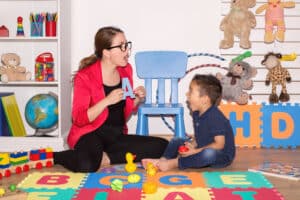For kids diagnosed with autism spectrum disorder (ASD) mastering skills can present a set of challenges. Developing the ability to interact socially is crucial, for their well being and growth. Applied behavior analysis (ABA) therapy stands out as an approach for children with ASD focusing on enhancing communication, self help abilities and social skills while addressing behaviors that may hinder progress in these areas.
ABA therapy centers around utilizing behavior analysis principles to help individuals with ASD learn how to communicate and engage effectively with others. By honing in on social skill development ABA therapy empowers children with ASD to navigate interactions cultivate connections and enhance their overall quality of life.
What are Social Skills?
Social skills encompass the capacity to navigate situations adeptly and communicate effectively with others. These skills cover a spectrum of behaviors and abilities that enable individuals to connect, interact, and forge relationships with those around them. Being proficient in these skills is vital across contexts such as school work environments and everyday social scenarios.
Mastering skills involves grasping cues interpreting body language and facial expressions accurately maintaining eye contact appropriately modulating tone of voice effectively understanding societal norms initiating conversations confidently actively listening during interactions taking turns when communicating thoughts or ideas sharing experiences or possessions respectfully according to boundaries set by others following instructions diligently collaborating harmoniously within group settings.
Yes individuals, with autism can enhance their abilities. Developing skills can pose a challenge for ones with Autism Spectrum Disorder (ASD). The difficulties they face may include struggles with interpreting signals comprehending communication and grasping societal norms. Difficulties in social skills may lead to social isolation, difficulties in forming and maintaining relationships, and limited participation in social activities.
Applied Behavior Analysis (ABA) therapy is instrumental in teaching skills to children with ASD. ABA therapists employ behavior analysis methods to assist children in comprehending and utilizing cues effectively understanding body language and facial expressions and cultivating social conduct.
By focusing on these areas ABA therapy aids children in enhancing their interactions and forming connections, with others.
Understanding ABA Therapy and Its Role in Social Development
What treatment enhances social skills in autism? ABA therapy, also known as applied behavior analysis therapy is a established and research backed approach used to treat individuals diagnosed with autism spectrum disorder.
This therapy is rooted in the principles of behavior analysis, which delve into how behaviors shaped by the environment and how they can be adjusted to achieve desired results. In the realm of development ABA therapy strives to boost abilities, in children with autism spectrum disorder.
It acknowledges the significance of skills in fostering interactions and meaningful connections, with others. ABA therapy employs behavior analysis methods to impart social interaction skills to children diagnosed with ASD.
The initial phase of ABA therapy involves an evaluation of the child’s aptitudes, pinpointing areas that require enhancement. Drawing from this assessment the therapist devises personalized objectives and tactics geared towards refining competencies.
How Does ABA Therapy Improve Social Skills?
ABA Therapy improves skills through a variety of methods and approaches.
Some ABA social skills activities are role-playing scenarios which allow children to practice social situations and conversational skills. Positive reinforcement is used to encourage and reinforce desired social behaviors.
In group sessions children, with ASD benefit from an structured environment where they engage in peer interactions and cooperative play. ABA therapy facilitates the development of skills that enable children to form meaningful connections with others.
Role-Playing Scenarios in ABA Sessions
Role playing scenarios serve as a technique within ABA therapy to improve the skills of children with ASD. By participating in role playing activities children can practice interactions. Enhance their conversational abilities. Some advantages of incorporating role playing in ABA sessions include:
- Encouraging children to actively participate in interactions and practice responses
- Providing a secure and controlled setting for learning and exploring various social scenarios
- Helping children comprehend social cues, body language and facial expressions
- Allowing children to refine conversational skills such as initiating conversations maintaining eye contact and engaging in turn taking during discussions
- Fostering confidence and self esteem in social settings
During role playing exercises ABA therapists utilize visual aids, prompts and scripts to assist the child’s engagement. They offer feedback and positive reinforcement to aid children in enhancing their skills and navigating situations more effectively.
Utilizing Positive Reinforcement
Positive reinforcement plays a role in ABA therapy by strengthening skills among children, with ASD through the use of rewarding stimuli.
It includes giving rewards, compliments or tokens for desired behaviors, which increases the chances of those behaviors happening in the future. In ABA therapy, for social skills training positive reinforcement is used in ways such as:
- Providing praise and acknowledgment for using appropriate social behaviors
- Using token systems or charts to monitor and encourage progress in social skills
- Offering preferred activities or items as incentives for displaying desired social behaviors
- The use of social reinforcement like high fives hugs or verbal praise is also common to recognize and promote social interaction.
Through reinforcement children learn the importance of social behaviors and are encouraged to continue practicing and enhancing their skills. By linking reinforcement with behaviors ABA therapists create a supportive environment that fosters children’s development of social skills.
Group Sessions and Peer Interaction
Group sessions and peer interactions are pivotal in ABA therapy for enhancing skills. These sessions allow children with ASD to engage with peers in a setting. Some advantages of group sessions and peer interactions, in ABA therapy comprise:
- Promotes peer interaction and the development of abilities
- Promotes play and sharing turns
- Gives chances to hone social skills through live interactions, with peers
- Fosters friendships and fosters social bonds
- Creates a safe welcoming environment for kids to learn and develop
Group therapy and interactions with peers in applied behavior analysis (ABA) therapy can benefit children with autism spectrum disorder (ASD) by providing an structured environment for developing skills.
These sessions allow children to learn from one another practice skills and form connections in an inclusive environment.
Benefits of ABA Therapy for Social Skills
ABA therapy offers advantages for children with ASD in improving their skills. It delivers targeted interventions and strategies to enhance interactions, communication abilities and overall social competency. Through ABA therapy methods children with ASD can boost their skills leading to quality of life and increased chances for meaningful connections, with others.
Navigating Social Settings
Navigating situations can present challenges, for children with ASD as they might find it hard to grasp conventions and expectations. ABA therapy plays a role in assisting children in acquiring the skills needed to navigate social environments effectively. By honing in on abilities like understanding social cues interpreting appropriate behavior and adhering to social norms ABA therapy empowers children with the necessary tools to navigate social settings more proficiently.
This involves guiding them on adjusting their behavior according to contexts and cultivating self awareness during social interactions. With the assistance and encouragement of ABA therapists children with ASD can enhance their confidence in settings and actively participate in meaningful exchanges with others.
Developing Empathy and Understanding Emotions
Fostering comprehending emotions are aspects of developing social skills. ABA therapy aids children with ASD in fostering empathy by instructing them on identifying and comprehending others emotions. Through techniques such as role playing and sharing stories about real life experiences ABA therapists help children understand emotions better and learn appropriate ways to react.
Furthermore ABA therapy places emphasis on regulation, which plays a role in interpersonal interactions. Children, with ASD may encounter challenges in recognizing and managing their emotions, which can lead to hurdles in navigating through scenarios.
ABA therapists teach methods to help children with regulation like breathing and positive self talk so they can manage their feelings better and have more successful social interactions.
When children, with ASD learn to empathize and understand emotions they can enhance their skills. Form stronger relationships with people around them.
Improving Nonverbal Communication Cues
In interactions nonverbal signals such as body language, facial expressions, eye contact and tone of voice are crucial. Children with ASD often find it challenging to grasp and use these cues effectively. ABA therapy focuses on enhancing communication abilities by teaching children how to interpret and respond appropriately to these signals.
ABA therapists employ strategies like video modeling and practical exercises to help children with ASD recognize and comprehend cues. They assist children in maintaining eye contact adjusting their tone of voice and using body language during interactions.
By improving their understanding of nonverbal communication cues through ABA therapy children can become more proficient, in engaging with others and forming connections.
What Skills are Taught in Social Skills Programs in ABA Therapy?
ABA social skills curriculum focuses on teaching various essential social abilities to children, particularly those with autism. Here are some key aspects of social skills taught in ABA programs:
- Breaking Down Complex Skills: Social skills programs, in applied behavior analysis (ABA) simplify abilities like turn taking, conversing, sharing, group participation reading facial expressions and understanding tone of voice by breaking them down into smaller parts. By teaching these components individuals can establish a basis for overall social competency.
- Behavioral Objectives: ABA programs set observable and measurable objectives to track progress and assess the effectiveness of teaching methods. For example a goal might focus on responding to peers greetings than just saying “greetings” in general.
- Individualization: Since everyone has aspirations and needs ABA therapists customize social skills programs to suit each learners unique requirements. Whether its enhancing conversation skills, respecting space improving hygiene habits mastering life skills or community based activities – the emphasis is on support.
- Behavioral Skills Training (BST): One common technique within ABA is Behavior Skills Training (BST) which involves explaining the significance of a skill demonstrating it through modeling behavior practicing together with feedback provided along the way. This structured approach aids individuals in acquiring skills
Overcoming Challenges in Social Skill Development
Children with Autism Spectrum Disorder (ASD) often encounter obstacles in developing abilities such, as anxiety and diverse individual needs. ABA therapy offers tailored strategies to tackle these challenges and promote the growth of skills.
Children, with autism spectrum disorder (ASD) often face social anxiety challenges, which are effectively addressed by ABA therapists at Move Up ABA. The therapy involves using tailored techniques to assist children in managing anxiety.
These methods encompass exposure to settings in a manner teaching relaxation methods and offering social scripts for guidance during interactions. It is essential to recognize and cater to each child’s needs when providing social skills training. A personalized approach is taken in ABA therapy to identify areas for improvement, in skills and develop customized strategies accordingly.
Through this approach ABA therapy proves successful in enhancing skills and aiding children in overcoming obstacles related to social interaction.
Addressing Social Anxiety in Children with ASD
Children, with autism spectrum disorder (ASD) often face anxiety, which can impact their social skills development. At Circle City ABA ABA therapy incorporates strategies to help children cope with anxiety. It can be overwhelming for children with ASD to engage in interactions when experiencing anxiety.
Therapists at Circle City ABA gradually expose children to situations to boost their confidence and lessen anxiety. They teach coping mechanisms like breathing and positive self talk to assist children in managing their anxiety effectively.
Through addressing anxiety in ABA therapy children acquire the tools needed to navigate interactions more comfortably and confidently.
Tailoring Strategies to Individual Needs
Circle City ABA adopts an approach, in therapy tailoring strategies according to each child’s needs. This ensures that the child’s specific strengths and challenges are tackled during the process of enhancing their skills.
A comprehensive skill evaluation is conducted to pinpoint areas where improvement is needed in skills. Based on this assessment targeted objectives are set to enhance these skills.
| Assessment | Targeted Goals |
| Communication skills | Initiate conversations, maintain eye contact, and read social cues |
| Emotional understanding | Identify and understand emotions, demonstrate empathy |
| Interactive play | Develop turn-taking skills, follow game rules, play gently |
| Active listening | Practice active listening and responding to others |
| Respecting boundaries | Understand and respect personal space and boundaries |
| Following directions | Learn to follow instructions and differentiate between who to trust |
| Working collaboratively | Develop skills to work effectively with others |
| Self-advocacy | Ask for help, express preferences, and assert oneself |
By tailoring strategies to the individual needs of each child, ABA therapy maximizes the effectiveness of social skills training and supports positive behavioral changes.
Conclusion
In summary ABA therapy is vital, for boosting the abilities of children with ASD. Through activities like role playing, positive reinforcement and group sessions it aids in fostering empathy enhancing communication and navigating situations. By promoting interaction and friendship building skills ABA therapy tackles issues such as anxiety while tailoring approaches to meet individual needs.
The positive effects of ABA therapy go beyond the sessions leaving a lasting impact on social skill enhancement. Understanding the role of ABA therapy in development is crucial if you’re considering it for your childs well being and growth.
Is your child with autism facing challenges in interactions? Move Up ABA a provider of ABA therapy in Maryland offers support! We create an environment where kids can cultivate social skills through our home based ABA therapy and nearby ABA social skills groups.
Our experienced therapists create personalized programs that target communication, turn-taking, and social interaction. Move Up ABA empowers each child to build meaningful relationships and thrive socially. Contact us today and see how we can help your child connect with others!
Frequently Asked Questions
What age is best to start ABA Therapy for social skills?
The ideal age to begin ABA therapy for enhancing skills varies based on the requirements and developmental stages of each child. It is generally advised to start to make the most of ABA therapy and enhance the child’s well being. Commencing ABA therapy at an age can serve as a step, in fostering robust social skills.
Can ABA Therapy help with severe social skill deficits?
Certainly ABA therapy can be beneficial for children facing challenges in aptitude. Tailoring its approach to suit needs ABA therapy encompasses an array of skills. By addressing these deficiencies and implementing targeted interventions ABA therapy aids in nurturing capabilities among children with ASD.
How long does it typically take to see improvements in social skills?
The timeframe for observing enhancements in skills differs from one child to another. ABA therapy involves a learning process that dissects skills into components. Depending on the child’s progress and requirements progress may become evident within months to a year of engagement with ABA therapy.
Are the social skills learned through ABA Therapy lasting?
Indeed the social competencies acquired through ABA therapy can yield enduring effects. Emphasizing the establishment of skills and imparting strategies, for applying these abilities in real world scenarios ABA therapy fosters long term benefits by reinforcing skills and encouraging their application beyond therapeutic settings.










